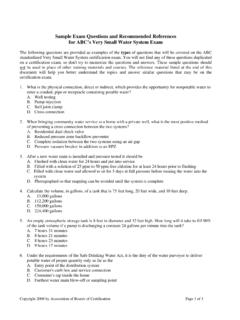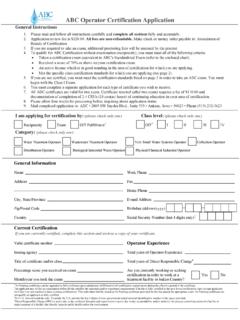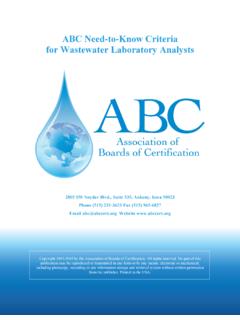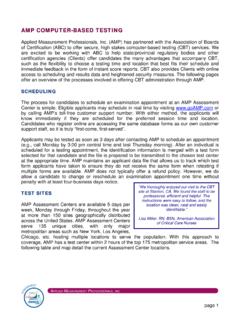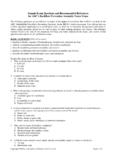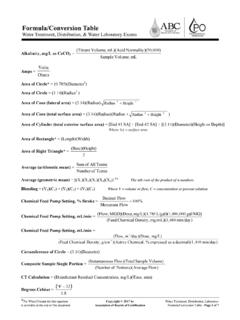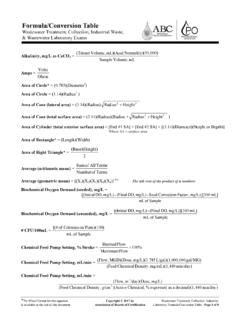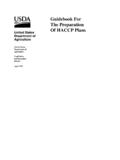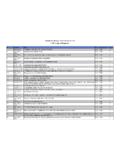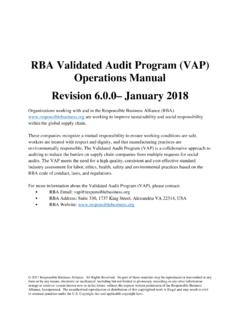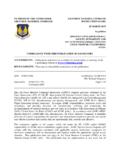Transcription of Very Small Water System Operators’ Guidebook to …
1 Very Small Water System Operators Guidebook to Preparing for Certification Prepared by: Association of Boards of Certification Publication Submitted to: Environmental Protection Agency Agreement Number X-980563-01-0 June 15, 2000 Table of Contents Introduction and Purpose of the Guidebook .. 1 Summary of the National Certification Guidelines .. 2 Need-to-Know Job Tasks and Capabilities .. 4 Exam Specifications .. 7 Sample Test Questions .. 8 References and Correct Answers .. 19 Training Opportunities and Resources .. 24 State Certification Programs .. 25 Introduction and Purpose of the Guidebook 1 Introduction and Purpose of the Guidebook The purpose of this Guidebook is to help operators of very Small Water systems serving a maximum population of 100 understand the provisions and purpose of the Final Guidelines for the Certification and Recertification of the Operators of Community and Nontransient Noncommunity Public Water Systems.
2 This Guidebook describes the certification requirements of the EPA Guidelines, operator need-to-know job tasks and capabilities, exam specifications, sample test questions, and additional information relating to operator training opportunities. Summary of the National Certification Guidelines 2 Summary of the National Certification Guidelines The Final Guidelines for the Certification and Recertification of the Operators of Community and Nontransient Noncommunity Public Water Systems1 require that all community and nontransient noncommunity public Water systems have a certified operator in responsible charge. A community Water System is defined by the EPA as a public Water System that provides Water to at least 15 service connections used by year-round residents or regularly serves at least 25 year-round residents. A nontransient noncommunity Water System is defined by the EPA as a public Water System that is not a community Water System and that regularly serves at least 25 of the same persons over six months per year (p.)
3 5921, section IV). The objectives of the Guidelines are to ensure that: Customers of any public Water System be provided with an adequate supply of safe, potable drinking Water . Consumers are confident that their Water is safe to drink. Public Water System operators are trained and certified and that they have knowledge and understanding of the public health reasons for drinking Water standards (p. 5919, section ). To achieve these objectives the EPA developed the following operator certification guidelines. Please note that the EPA guidelines are minimum requirements. States may impose more strict requirements so it is essential for operators to contact their State Certification Program listed in the last section of this Guidebook for specific state requirements. Regulations for Certification Each community and nontransient noncommunity Water System must be under the responsible charge of an operator certified at a level equal to or greater than the System classification.
4 This person has the authority to make decisions that affect Water quality or quantity. In addition, all operating personnel that make process control/ System integrity decisions about Water quality or quantity that affect public health must be certified (p. 5919, section ). A certified operator must be available during each operating shift. Requirements for Certification To become certified an operator must satisfy minimum education and experience requirements and pass the appropriate certification examination. The EPA minimum requirements for certification are: Education - The operator must possess a high school diploma or general equivalency diploma (GED). States may allow experience and/or training to be substituted for the education requirement. Experience - The operator must meet the State s on-the-job experience requirement. Examination - The operator must pass a certification exam. The exam will cover the knowledge, skills, ability and judgment necessary to operate systems within the State.
5 Current operators that do not meet these newly imposed requirements may be eligible to be grandparented through the State Certification Program. If grandparenting is allowed by the State Certification Program, operators may be permitted to become certified, with the System owner s consent, without meeting all of the certification requirements. This is a restricted certificate and grandparented operators must meet all certification renewal requirements. Among other restrictions, the Guidelines specify that grandparenting is permitted only to existing operator (s) in responsible charge of existing systems which, because of State law changes to meet these guidelines, must for the first time have a certified operator . If allowed by the State, certification for the grandparented operator must be site specific and non-transferable to other operators. If the classification of the plant or distribution System changes to a higher level, then the grandparented certification will no longer be valid ; 1.
6 Environmental Protection Agency, 1999. Final Guidelines for the Certification and Recertification of the Operators of Community and Nontransient Noncommunity Public Water Systems. Federal Register, Vol. 64, No. 24 Friday, February 5, 1999. Summary of the National Certification Guidelines 3and if the grandparented operator chooses to work for a different Water System , he or she must meet the initial certification requirements of that System (p. 5920, section ). Renewal Operators that meet the certification requirements and pass the certification exam will be certified by the State Certification Program for a specific period of time. The Guidelines require certificates to be renewed within a period of three years. Operators must attend State approved training in order to renew their certificates. Need-to-Know Job Tasks and Capabilities 4 Need-to-Know Job Tasks and Capabilities ABC conducted a very Small Water System operator job analysis to identify the most critical job tasks performed by operators and the capabilities required to competently perform these job tasks.
7 Over 450 operators were surveyed by ABC as part of this process. In the survey, operators provided data on how frequently job tasks are performed and the potential seriousness of performing these tasks incorrectly. The results of this survey were used to develop the following Need-to-Know Criteria. The Need-to-Know Criteria is a list of the subjects that a Small Water System operator needs to know to properly operate a System . Tasks and their requisite capabilities performed by at least 50% of the survey respondents and with a high seriousness rating are included in this list. This list includes both community and nontransient noncommunity public Water systems. Examples of nontransient noncommunity systems include schools, day-care centers, and factories. This type of information is used as the basis for developing certification exams. Evaluate characteristics of source Water Job tasks Capabilities Evaluate characteristics of source Water , such as.
8 Ability to communicate observations verbally and in writing Bacteriological Ability to discriminate between normal/abnormal conditions Biological Knowledge of normal characteristics of Water Chemical Knowledge of wellhead protection Physical Operate System Job tasks Capabilities Add liquid disinfectants Ability to adjust disinfectant feed rates Monitor, evaluate, adjust chlorine disinfection Ability to calculate dosage rates Inspect, maintain, repair flow measurements Ability to confirm disinfectant strength Inspect, maintain, repair well operation Ability to diagnose/troubleshoot process units Perform leak detection Ability to interpret Material Safety Data Sheets Ability to maintain processes in normal operating condition Ability to measure disinfectant weight and volume Ability to perform basic math Ability to prepare and apply disinfectants Knowledge of general biology and chemistry Knowledge of disinfectant concepts and properties Knowledge of disinfectant processes and design parameters Knowledge of general electrical and mechanical principles Knowledge of normal chemical range Knowledge of personal protective equipment Knowledge of principles of measurement Knowledge of proper handling and storage of disinfectants Knowledge of proper lifting procedures Knowledge of regulations Need-to-Know Job Tasks and Capabilities 5 Need-to-Know Criteria (Continued)
9 Collect, perform, and interpret laboratory analyses Job tasks Capabilities Collect, perform, and interpret laboratory analyses, such as: Ability to calibrate instruments Ability to follow written procedures Chlorine demand Ability to interpret Material Safety Data Sheets Chlorine residual Ability to perform disinfection calculations Microbiological Ability to recognize abnormal analytical results Knowledge of general chemistry Knowledge of laboratory equipment Knowledge of principles of measurement Knowledge of proper disinfectant handling and storage Knowledge of proper safety procedures Knowledge of proper sampling techniques and procedures Knowledge of quality control and assurance practices Knowledge of regulations, such as the Safe Drinking Water Act Establish safety plans and apply safety procedures Job tasks Capabilities Establish safety plans and apply safety procedures, in areas such as: Ability to communicate safety hazards verbally and in writing Ability to demonstrate safe work habits Chemical hazard communication Ability to follow written procedures Confined space entry Ability to identify potential hazards and unsafe work conditions Electrical grounding Ability to operate safety equipment General safety and health Knowledge of potential impact of disasters on facility Lifting Knowledge of regulations Lock-out/tag-out Knowledge of risk management Personal hygiene Personal protective equipment Slips, trips, and falls Operate equipment Job tasks Capabilities Operate equipment, such as.
10 Ability to evaluate and adjust operation of equipment Chemical feeders Ability to monitor electrical and mechanical equipment Electronic testing equipment Knowledge of disinfection concepts Instrumentation Knowledge of function of tools Motors Knowledge of general electrical and mechanical principles Power tools Knowledge of proper safety procedures Pumps Knowledge of regulations Knowledge of start-up/shut-down procedures Need-to-Know Job Tasks and Capabilities 6 Need-to-Know Criteria (Continued) Evaluate operation of equipment Job tasks Capabilities Check speed of equipment Ability to adjust equipment Inspect equipment for abnormal conditions Ability to calibrate equipment Perform maintenance on chemical feeders Ability to diagnose/troubleshoot process units Perform maintenance on pumps Ability to discriminate between normal/abnormal conditions Read meters Ability to follow written procedures Read pressure gauges Ability to monitor electrical and mechanical equipment Ability to perform general maintenance and repairs Ability to record information Ability to report findings Ability to use hand tools Knowledge of facility operation and maintenance Knowledge of general electrical and mechanical principles Knowledge of proper safety procedures Knowledge of safety regulations Knowledge of start-up/shut-down procedures Perform administrative duties Job tasks Capabilities Establish recordkeeping System for facility
